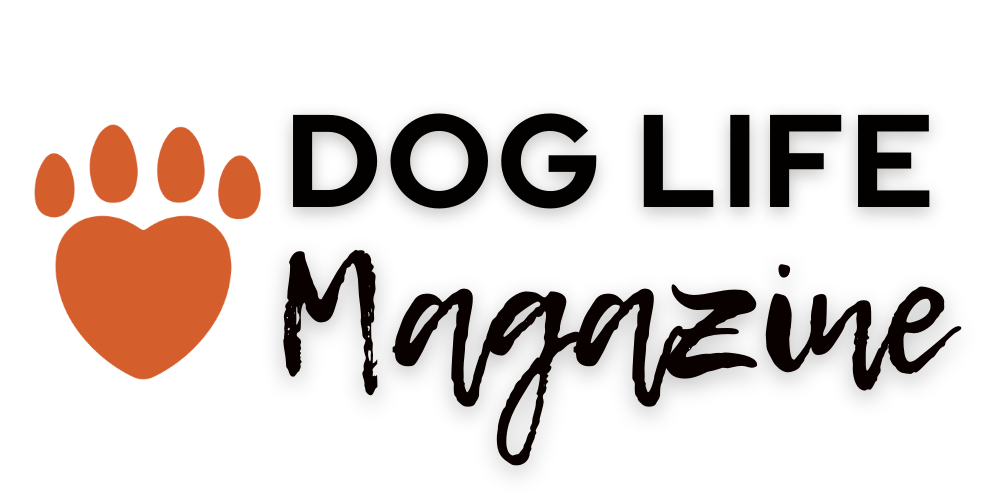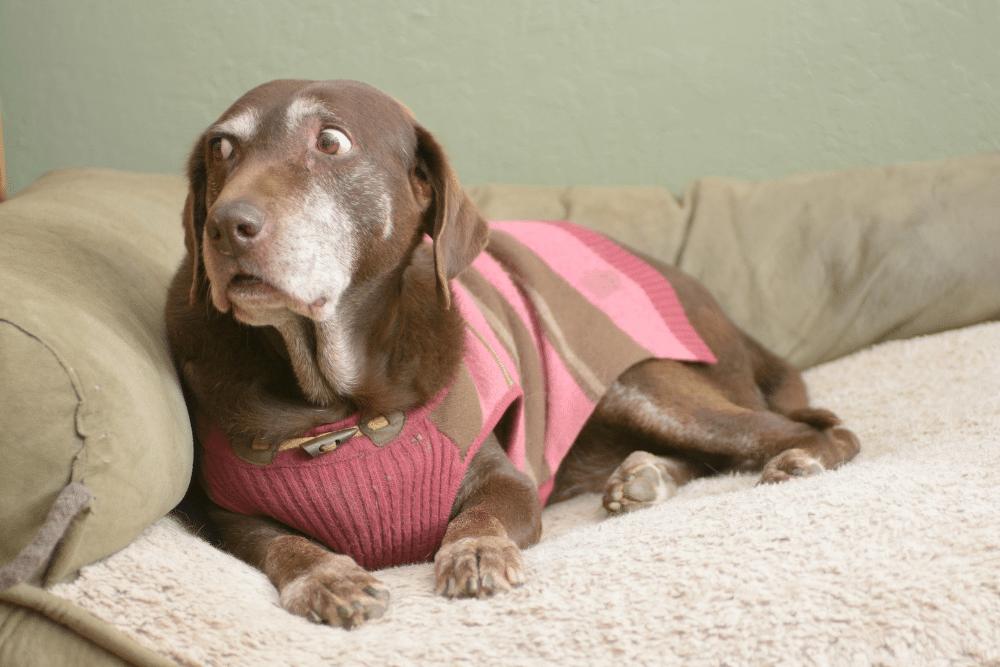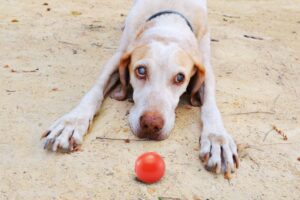We humans are a fast-paced, high-strung lot. Go, go, go, work, work, work, busy, busy, busy. Anxiety comes with the territory. Sometimes, however, Calgon can’t take it away, and our anxiety becomes debilitating. And so it is with our furry friends. You may not even know that dog anxiety (Is that really a thing?) exists. But yes, it really is a thing. And it can be just as debilitating to our canine friends as our anxiety is to us.
First, an important disclaimer on behalf of nervous dogs everywhere: Anxiety is not a function of training or lack thereof.
You wouldn’t attribute your own anxiety to being ill-mannered or uneducated. And the same is true for dog anxiety.
How dogs with anxiety express that anxiety, however, is different than how we humans express anxiety. (We hope, anyway.)
Signs of dog anxiety
What are some signs that my dog might be nervous or have anxiety?
- Aggression: Because fear- and anxiety-related aggression is the most common form of aggression, it’s worth discussing. The underlying principle of this kind of aggression, whether defensive or offensive, is that the dog wants the stimulus to go away. He’s not a bad dog, he’s a fearful dog. Read more about anxiety-induced aggression and how to recognize it in the above link.
- Increased vigilance: A dog that is anxious is often on high alert, anticipating the next bad thing that can happen.
- Avoidance: Fearful, anxious dogs may also want to go into hiding to feel safe from whatever frightens them.
- Urinating or defecating in the house
- Drooling
- Panting
- Trembling
- Destructive behavior: “Dog shaming” has become a viral comedic outlet in recent years. You may remember Denver and her squinty-eyed “guilty” faces. But destructive behavior, especially in adult dogs, is usually an indication of anxiety in dogs. It can also be pent-up energy that turns into looking for something to do. Either way, the destructive dog is sending a message.
- Vocalization/excessive barking
- Pacing
- Restlessness
- Repetitive or compulsive behaviors
- Depression
- Body language cues: Dogs communicate through body language. And it’s our responsibility to put down our cell phones and pay attention to what they’re saying. Cues like “whale eyes,” retracted ears, hunched back, lowered tail, and a diverted look can all signal that your dog is anxious, stressed, and/or very uncomfortable in his current circumstances.
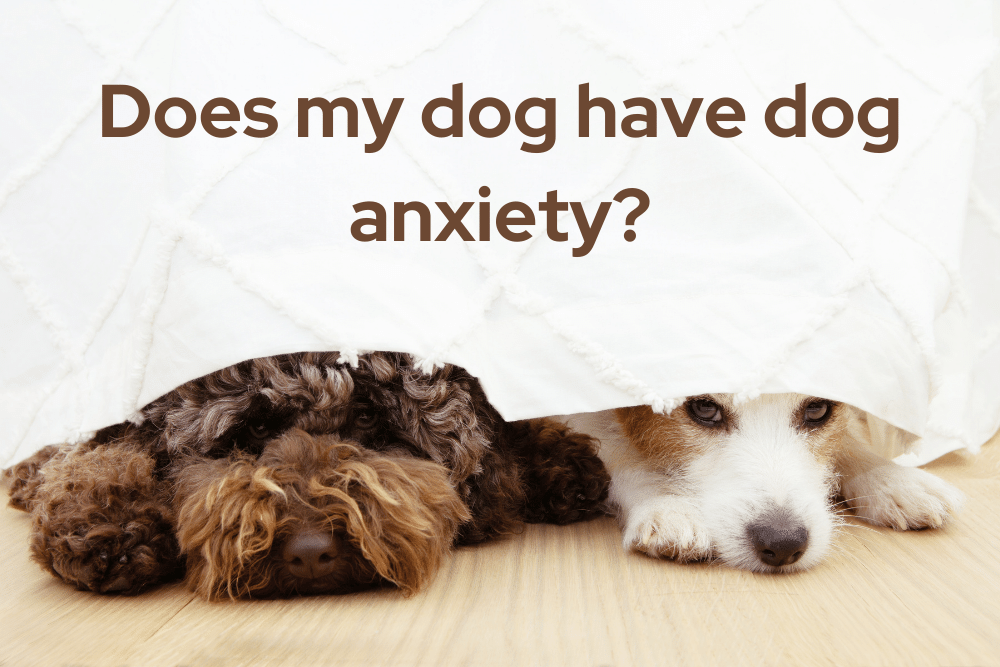
Types, causes & cures for dog anxiety
How do I know what is causing my dog’s anxiety? Are there different types of dog anxiety? Yes! There are different types and below we explain the four different types of dog anxiety:
- Separation anxiety in dogs
- Rescue & former shelter dog anxiety
- Aging-related anxiety
- Fear of sudden or loud noise dog anxiety
Separation anxiety in dogs:
We shouldn’t be surprised that our dogs don’t like to be left alone. They are, after all, pack animals.
Dogs who suffer from separation anxiety may show signs the second you walk out the door with your keys in hand.
If you come home a few hours later, you may be greeted by a dog who has spent several hours pacing, vocalizing, urinating, and chewing.
In other words, he was miserable.
So what to do?
What can I give my dog for separation anxiety?
You don’t “train” separation anxiety out of your dog, and you certainly should never, ever punish it.
Your goal is to change your dog’s perception and experience of being alone.
First, always give your dog a good walk or bout of exercise before you leave, all dogs vary in the amount of daily exercise they need. So try to make sure you’re giving them the daily exercise they require.
When you are almost ready to leave, give him a stuffed Kong (frozen contents will make it last longer) or food-enrichment toy to occupy and pacify him.
Leave soft music or the television playing (volume on low, remember dogs have excellent hearing).
And, if your dog is too anxious to be left out, put him and his Kong in a comfy crate. Make sure he has ample room to stand up and lie down.
Finally, when you leave and return, don’t make a big to-do out of it. Tough to do when you want to be with your pupper as much as he wants to be with you.
Staying calm and nonchalant about your comings and goings will deliver the message that everything is copacetic. Just another day in doggie paradise.
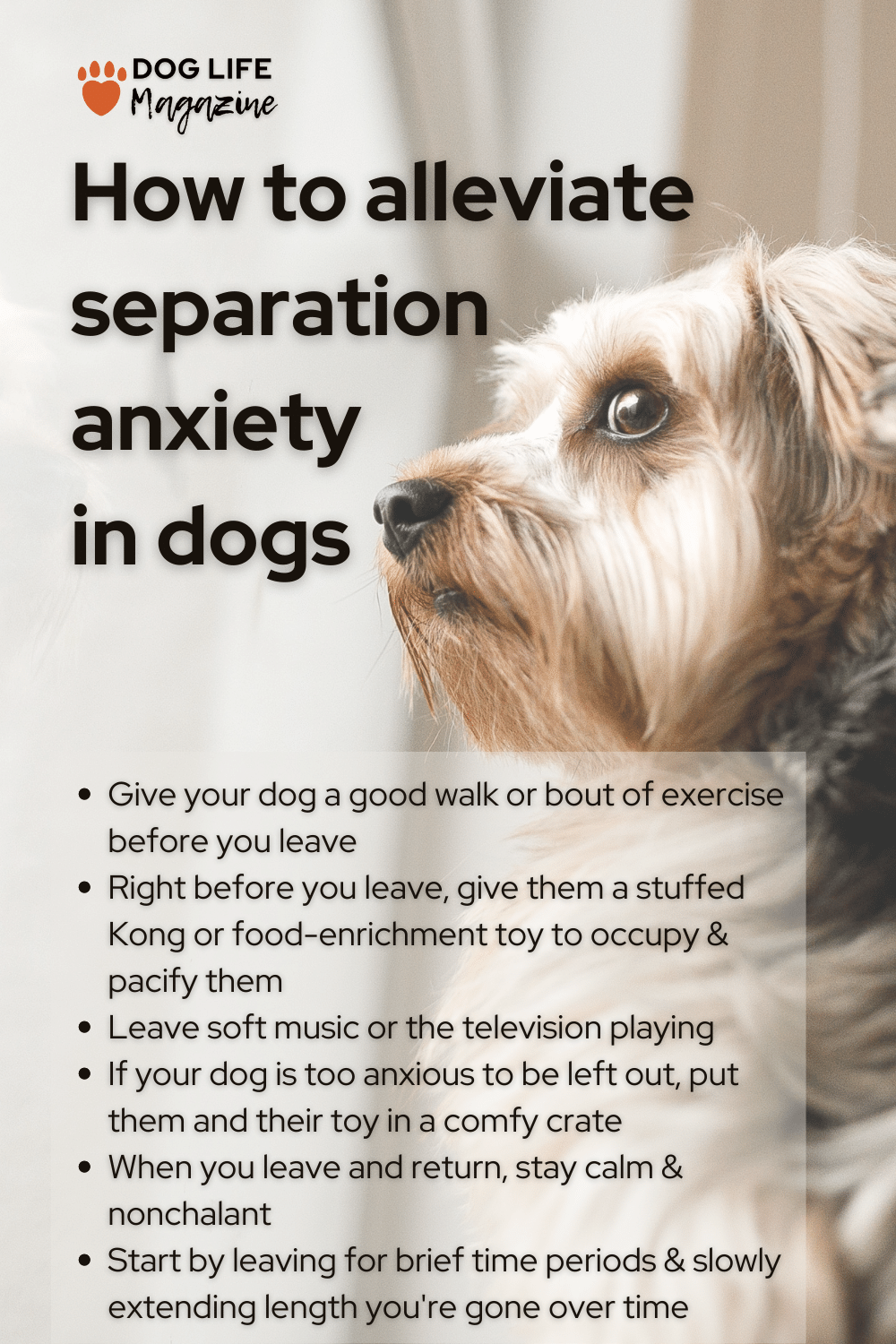
Rescue/former shelter dog anxiety:
People who rescue the homeless, abandoned, and abused are a special breed of Homo sapiens.
And those who have rescued or fostered many times know the Rule of Threes: 3 days, 3 weeks, 3 months.
For the first 3 days, expect your rescue puppy or dog to be nervous, overwhelmed, even shut down.
Over the first 3 weeks, you should see your dog start to settle into his surroundings and feel more comfortable.
The biggie is the 3 months, as this is how long it takes for a dog to build trust and bond with you.
Ways to help rescue dogs or shelter dogs with anxiety:
Before you bring a rescue dog home, have an appropriately sized crate set up. Make it comfy on the inside and put a blanket over the top to create a cozy den.
Allow your new family member as much time as he needs to simply decompress without a lot of attention from people and other pets.
Aging-related anxiety:
Older dogs can develop canine cognitive dysfunction (CCD/CDS), a condition similar to early Alzheimer’s in humans.
In extreme cases, a dog may circle repetitively, pace, howl, and become irritable and/or disoriented. He may also get stuck in tight places and not know how to get out.
Senior dogs are truly so special, and those sunset months and years are a time to draw them near and be with them as much as possible.
How to care for a dog with aging-related dog anxiety:
In their later years, many dogs lose part or all of their vision and hearing. Despite being scent-dominant, the loss of orienting senses can cause anxiety. So keep them close when walking, and don’t let them off-leash in an unsecured place.
You may need to move or cover pieces of furniture and block off parts of your home to ensure your senior’s safety.
Your vet may prescribe medication or a holistic remedy like CBD oil to help your sweet senior feel calm and safe.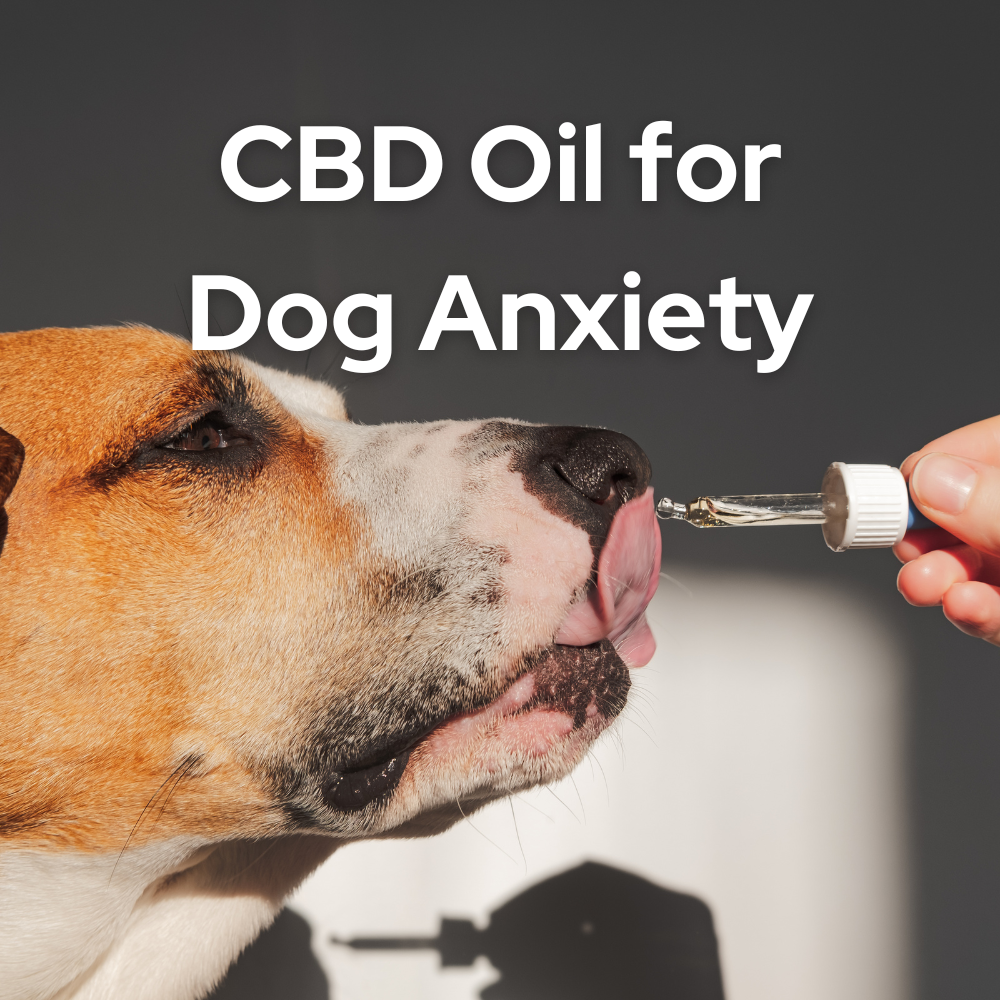
Fear of loud and sudden noises:
July 4th, New Year’s, loud traffic, loud bangs, things breaking. Some dogs, like humans, are just more sensitive to loud and sudden noises.
They have no way of understanding what these petrifying explosions are that humans find so necessary for celebrations.
Every year on July 5th the shelters are overrun with dogs that went missing during fireworks the night before. And too many dogs don’t even make it that far.
If you’ve ever had a dog terrified of fireworks and thunderstorms, you understand how heartbreaking it is to witness.
Dog anxiety treatment for loud noises:
Thundershirts have mixed efficacy. Some dogs benefit, some don’t.
Always keep your dog inside during fireworks and storms. Anticipate the loud noises by playing white noise and the TV or radio in the background.
Best plan? Stay home and cuddle.
And, if your vet has given you an anti-anxiety prescription, give it early so it has time to take effect before the noise hits. An alternative to prescription medication for anxiety are calming supplements such as CBD chews, CBD oil, or CBD softgels. Always consult with your vet before giving your dog a new supplement.
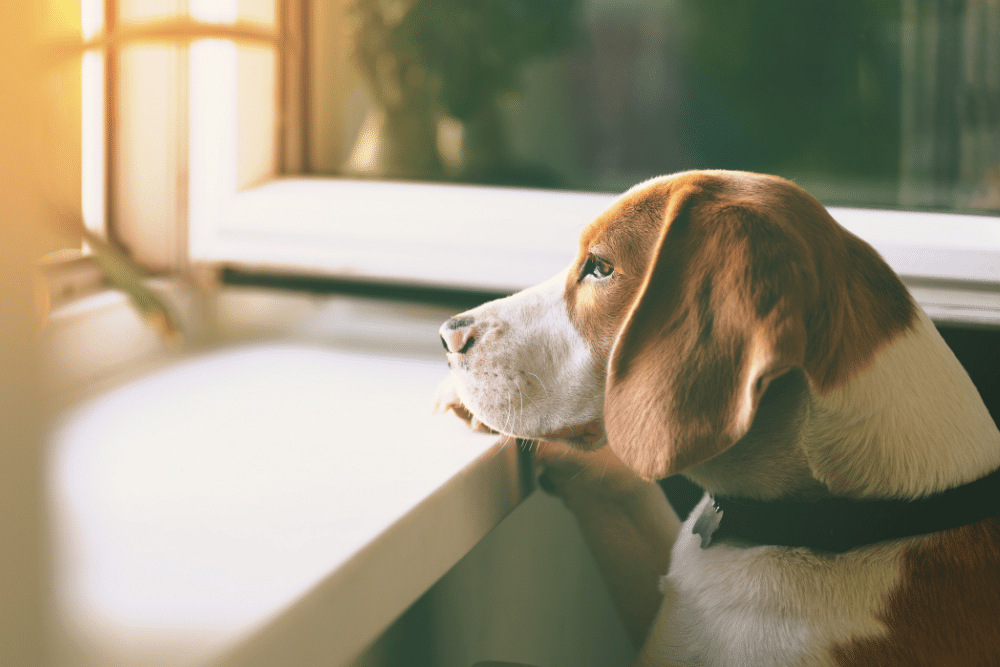
Yes, dog anxiety is a real thing.
In our experience:
Some dogs do develop a generalized anxiety disorder that may require medication to manage. The Dog Life Mag’s team of dog lovers has experienced everything from shelter dog anxiety to separation anxiety to anxiety from environmental disturbances like fireworks and thunderstorms.
General doggo maintenance tasks, such as grooming your dog, may become a challenge because dogs that are prone to anxiety may develop anxieties around grooming too. We’ve found that designating a calm, safe space in the home for grooming can be helpful. Give them a treat or toy while grooming to help your dog relate grooming to a positive reward. Designing your own DIY dog grooming station around your pet’s specific needs and personality can help too!
In our opinion:
But you hold the key to helping to manage (or rechannel) your dog’s anxiety…
…because you’re the one who holds their heart.
Why we chose what we chose:
Most of our team members took a holistic approach by first identifying the cause (e.g. separation), introducing a remedy one-by-one (e.g. acclimating our pet to us leaving by leaving for brief time periods and slowly extending it over time) and only introducing other remedies as needed (e.g. such as CBD chews or vet prescribed anxiety meds). We prefer to address the root cause instead of immediately opting for the band aid.
We hope this helps you in your quest to figure out the best remedy for your dog’s anxiety. Leave us a comment with your experience below!
